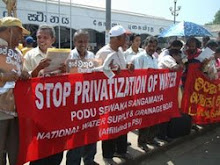December 1977:
- First Rural Water Supply & Sanitation Project
June 1981:
- Second Rural Water Supply & Sanitation Project
Mid 1980’s:
- Only 50% of Urban and 10% of rural inhabitants had access to potable water (only 25% of the nation’s population).
September 1992:
- Third Rural Water Supply & Sanitation Project
1997:
- Corposana was providing inadequate water and sanitation, and the World Bank $40 million to fund a project to establish a national urban drinking water concession. The requirements were that money would only be spent in communities that would pay 25% of the start up cost and all of the maintaining costs. $11.6 million came from villagers and $4.1 million from Paraguayan government.
1999-2004:
- The World Bank reduced funding to Paraguay because of the nation’s failure to privatize their water and sanitation systems.
2000:
- The PPIAF and the World Bank funded consultation to develop options for a privatized contract with Corposana
June 2002:
- Local Unions stood up against Water Privatization and turned down proceedings.
2003
- Water Privatization became an election issue and political parties supported or opposed the issue. Nicanor Duarte opposed the Essap (formerly Corposana) contract and promoted a public sector.
- Nicanor Duarte then appointed Cesar Cruz Roa as coordinator of water and telecommunications reform program.
Summer 2004:
- Supporters of Water Privatization revamped the legislation promoted in 2002 and were met with 5,000 protestors.
September 2005:
- International Monetary Fund, the Paraguayan government’s back up, drew up plans to introduce privatized water, with Essap
November 2005:
- The World Bank funded an analysis of restructuring privatization options.
May 2006:
- Government signed a management contract with Essap (and 4 others) agree to take hold 12/2006 to privatize water.
June 2007:
- Due to opposition of Water Privatization, the “Law on Water” was approved by parliament.
And that leads to where Asuncion is now in 2008, battling the fundamental human rights violation of privatized water in the capital.
This is not a new conflict.
-N

No comments:
Post a Comment